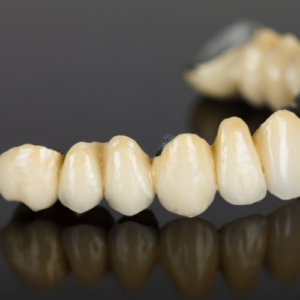
As we age, dental care becomes increasingly important in maintaining oral health and overall well-being. Dental bridges are a common restorative option for seniors who have lost one or more teeth. These bridges not only restore functionality for chewing and speaking but also enhance the aesthetics of the smile. Dr. Ninh at Dental 32 in Ashburn, VA, recognizes the significance of educating seniors about their dental options. In this blog post, we will explore the different types of dental bridges available for seniors, their benefits, and considerations for choosing the most suitable option.
What Are Dental Bridges?
Dental bridges are prosthetic devices used to replace missing teeth by bridging the gap between remaining natural teeth or dental implants. They consist of one or more artificial teeth (pontics) held in place by crowns or frameworks anchored to adjacent teeth or implants. Bridges are custom-made to match the shape, size, and color of natural teeth, restoring both function and appearance.
Types of Dental Bridges for Seniors
Traditional Dental Bridges:
Traditional bridges are the most common type and are typically used when there are natural teeth on both sides of the gap left by missing teeth. The procedure involves:
- Preparation: Dr. Ninh prepares the adjacent teeth (abutment teeth) by removing a portion of enamel to accommodate crowns.
- Impressions: Impressions of the teeth are taken to create a custom-made bridge in a dental laboratory.
- Placement: Once the bridge is ready, it is cemented onto the prepared abutment teeth, with the pontic filling the gap.
Traditional bridges are sturdy, reliable, and restore chewing function effectively.
Cantilever Bridges:
Cantilever bridges are similar to traditional bridges but are used when there are adjacent teeth on only one side of the gap. The pontic is anchored to one adjacent tooth, rather than both. This type of bridge requires careful consideration of the biting forces to ensure stability and durability.
- Advantages: Suitable for areas of the mouth with less stress during chewing, such as the front teeth.
- Considerations: Dr. Ninh evaluates the alignment and strength of the adjacent tooth carefully before recommending a cantilever bridge.
Maryland Bonded Bridges (Resin-Bonded Bridges):
Maryland bridges consist of a pontic that is held in place by metal or porcelain wings bonded to the back of adjacent teeth. This type of bridge is less invasive compared to traditional bridges because it involves minimal alteration of adjacent teeth.
- Ideal Candidates: Suitable for replacing front teeth where the biting forces are lighter.
- Aesthetics: Maryland bridges blend seamlessly with natural teeth, offering a natural appearance.
Maryland bridges are less durable than traditional bridges and may need replacement over time due to wear and tear.
Implant-Supported Bridges:
Implant-supported bridges are anchored to dental implants surgically placed in the jawbone, rather than adjacent natural teeth. This type of bridge is highly stable and prevents bone loss in the jaw.
- Benefits: Offers superior chewing function and stability compared to traditional bridges.
- Longevity: Implant-supported bridges can last a lifetime with proper care and maintenance.
- Procedure: Requires adequate bone density and healing time after implant placement before the bridge can be attached.
Dr. Ninh evaluates seniors’ oral health and bone density to determine if they are suitable candidates for implant-supported bridges.
Considerations for Choosing a Dental Bridge
Overall Oral Health:
- Dr. Ninh assesses the health of remaining natural teeth and gums to determine the most appropriate type of bridge.
- Conditions such as gum disease or tooth decay may need to be addressed before placing a bridge.
Location of Missing Teeth:
- The location and number of missing teeth influence the type of bridge recommended.
- Different bridges are suitable for replacing front teeth versus molars, based on biting forces and aesthetic considerations.
Budget and Insurance Coverage:
- Seniors should consider the cost of different bridge options and explore insurance coverage or financing plans available at Dental 32 in Ashburn, VA.
- Dr. Ninh and his team provide transparent pricing and discuss payment options to help seniors make informed decisions.
Long-Term Goals:
- Discuss long-term goals with Dr. Ninh regarding oral health and desired outcomes from dental treatment.
- Factors such as durability, aesthetics, and ease of maintenance should align with seniors’ preferences and lifestyle.
Benefits of Dental Bridges for Seniors
Restored Function: Bridges improve chewing ability and speech, allowing seniors to enjoy a varied diet and communicate effectively.
Enhanced Aesthetics: Bridges fill gaps left by missing teeth, restoring a natural-looking smile and boosting self-confidence.
Prevention of Dental Problems: By replacing missing teeth, bridges help prevent adjacent teeth from shifting out of position and reduce the risk of gum disease and jawbone deterioration.
Conclusion
Choosing the right type of dental bridge is a significant decision for seniors seeking to restore their smiles and oral function. Understanding the options available and addressing common misconceptions can empower seniors to make informed choices about their dental care. Dr. Ninh and the team at Dental 32 in Ashburn, VA, are committed to providing personalized care and guidance throughout the bridge placement process. Whether considering traditional bridges, implant-supported bridges, or other options, seniors can trust in Dr. Ninh’s expertise to achieve optimal oral health and a confident smile. Schedule a consultation today to explore dental bridge solutions tailored to your individual needs and embark on the journey towards a healthier, happier smile in your senior years.
FAQ
Non-covered benefits may not be deemed medically necessary by insurance providers but can still be essential for maintaining dental health.
If a procedure isn’t covered by insurance, it’s essential to discuss alternative payment options with your dentist and budget for the expense accordingly.
Regular dental check-ups are critical for preventive care, regardless of insurance coverage. Skipping them can lead to more significant dental issues in the future
Budgeting for dental expenses ensures that you can cover the costs of non-covered benefits and access necessary treatments when needed.
